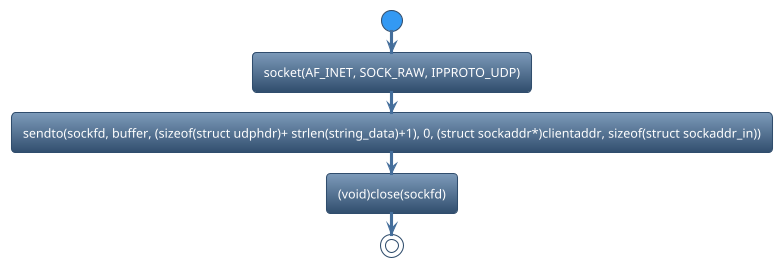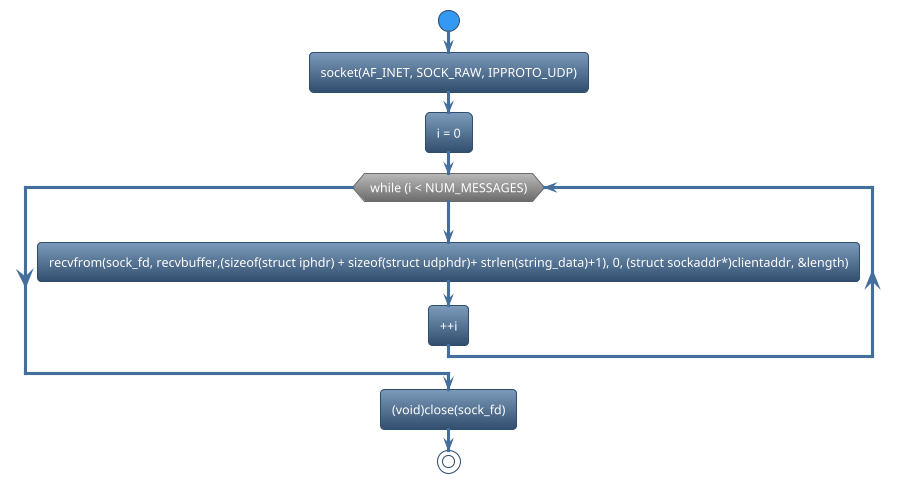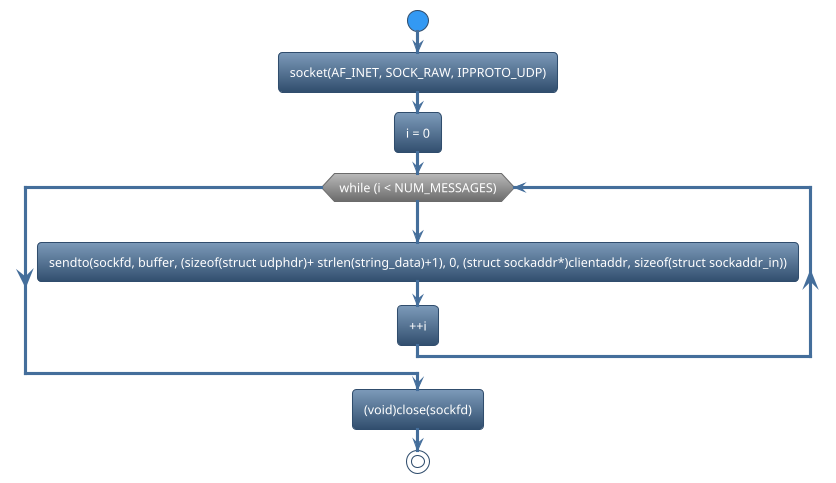Basic example raw af inet udp server and client
In this program, you are going to learn
How to create a Socket ?
How to send a data ?
How to recv a data ?
Topics in this section,
Topics in this section,
Let us answer few basic questions in this socket
What does socket(AF_INET, SOCK_RAW, IPPROTO_UDP) do?
See Answer
This call creates a raw socket in the AF_INET address family for direct access to UDP packets.
When would I use SOCK_RAW sockets with IPPROTO_UDP?
See Answer
This combination is used for tasks like packet sniffing, crafting custom protocols, or low-level UDP packet manipulation.
Can SOCK_RAW sockets be used for regular UDP communication?
See Answer
While technically possible, it’s not recommended. Higher-level APIs are more suitable for standard UDP communication.
What is the difference between IPPROTO_UDP and SOCK_RAW for UDP communication?
See Answer
IPPROTO_UDP specifies the transport protocol (UDP), while SOCK_RAW indicates a raw socket,
providing more control over UDP packet content.
What are common issues when working with raw UDP sockets?
See Answer
Common issues include permission errors, endianness mismatches, and improper packet handling.
How do I handle errors when using raw UDP sockets?
See Answer
Use error codes returned by system calls like socket and sendto for error handling. Log and handle errors gracefully.
Can raw UDP sockets be used for both sending and receiving data?
See Answer
Yes, raw UDP sockets can be used for both sending and receiving UDP packets.
Why is it important to check the return value of sendto() and recvfrom() in socket programming?
See Answer
It detects issues such as network errors or closed connections.

There are many functions used in socket. We can classify those functions based on functionalities.
Create Socket
Recvfrom data_packet
Close socket
socket()is used to create a new socket. For example,
sock_fd = socket(AF_INET, SOCK_RAW, IPPROTO_UDP);
recvfromis commonly used with sockets, where communication is connectionless. it provides information about the source (sender) of the data, including the sender’s IP address and port number. For example,
ret = recvfrom(sock_fd, recvbuffer,(sizeof(struct iphdr) + sizeof(struct udphdr)+ strlen(string_data)+1), 0, (struct sockaddr*)clientaddr, &length);
closeis used to close the socket To free up system resources associated with the socket. For example,
(void)close(sock_fd);
See the full program below,
#include <stdio.h>
#include <string.h>
#include <sys/socket.h>
#include <stdlib.h>
#include <linux/udp.h> /* UDP Header */
#include <arpa/inet.h>
#include <unistd.h>
#include <signal.h>
#include <linux/ip.h>
struct sockaddr_in
*clientaddr = NULL;
int sock_fd;
int SERVPORT=20000;
int DESTPORT=20001;
struct pseudo_iphdr {
unsigned int source_ip_addr;
unsigned int dest_ip_addr;
unsigned char fixed;
unsigned char protocol;
unsigned short udp_len;
};
unsigned short in_cksum (
uint16_t * addr, int len)
{
int nleft = len;
unsigned int sum = 0;
unsigned short *w = addr;
unsigned short answer = 0;
while (nleft > 1) {
sum += *w++;
nleft -= 2;
}
if (nleft == 1) {
*(unsigned char *) (&answer) =
* (unsigned char *) w;
sum += answer;
}
sum = (sum >> 16) +
(sum & 0xffff);
sum += (sum >> 16);
answer = (unsigned short) ~sum;
return (answer);
}
void interrupt_handler (
int signum)
{
(void)close(sock_fd);
free(clientaddr);
exit(0);
}
void validate_convert_addr(
char *ip_str,
struct sockaddr_in *sock_addr)
{
if (ip_str == NULL) {
perror("Invalid ip_str\n");
exit(EXIT_FAILURE);
}
if (sock_addr == NULL) {
perror("Invalid sock_addr\n");
exit(EXIT_FAILURE);
}
printf("IP Address: %s\n", ip_str);
if (inet_pton(AF_INET, ip_str,
&(sock_addr->sin_addr)) <= 0) {
perror("Invalid address\n");
exit(EXIT_FAILURE);
}
}
void main (int argc, char *argv[])
{
socklen_t length;
char buffer[1024] = {0};
unsigned char
recvbuffer[1024] = {0};
char *string =
"Hello client\n";
struct udphdr *udp_hdr = NULL;
char *string_data = NULL;
char *recv_string_data = NULL;
char *csum_buffer = NULL;
struct pseudo_iphdr
csum_hdr;
int ret;
signal (SIGINT,
interrupt_handler);
signal (SIGTERM,
interrupt_handler);
if (argc != 2) {
printf("%s<ip-addr>\n",
argv[0]);
exit(EXIT_FAILURE);
}
sock_fd = socket(AF_INET,
SOCK_RAW,
IPPROTO_UDP);
if (sock_fd < 0) {
printf("create a socket\n");
exit(0);
}
clientaddr = (struct sockaddr_in *)malloc(
sizeof(struct sockaddr_in));
if (clientaddr == NULL) {
printf("allocate memory\n");
goto end;
}
clientaddr->sin_family = AF_INET;
clientaddr->sin_port =
htons(DESTPORT);
validate_convert_addr(argv[1],
clientaddr);
memset(buffer, 0,
sizeof(buffer));
string_data = (char *)
(buffer + sizeof(struct udphdr));
strncpy(string_data,
string, strlen(string));
udp_hdr = (struct udphdr *)buffer;
udp_hdr->source = htons(SERVPORT);
udp_hdr->dest = htons(DESTPORT);
udp_hdr->len = htons(
sizeof(struct udphdr));
csum_buffer = (char *)calloc((
sizeof(struct pseudo_iphdr) +
sizeof(struct udphdr) +
strlen(string_data)), sizeof(char));
if (csum_buffer == NULL) {
printf("allocate csum buffer\n");
goto end1;
}
csum_hdr.source_ip_addr = inet_addr("127.0.0.1");
csum_hdr.dest_ip_addr = inet_addr("127.0.0.1");
csum_hdr.fixed = 0;
csum_hdr.protocol = IPPROTO_UDP;
csum_hdr.udp_len = htons(
sizeof(struct udphdr) +
strlen(string_data) + 1);
memcpy(csum_buffer,
(char *)&csum_hdr,
sizeof(struct pseudo_iphdr));
memcpy(csum_buffer +
sizeof(struct pseudo_iphdr), buffer,
(sizeof(struct udphdr) +
strlen(string_data) + 1));
udp_hdr->check = (in_cksum(
(unsigned short *) csum_buffer,
(sizeof(struct pseudo_iphdr)+
sizeof(struct udphdr) +
strlen(string_data) + 1)));
printf("checksum is %x\n",
udp_hdr->check);
free (csum_buffer);
memset(recvbuffer, 0,
sizeof(recvbuffer));
ret = recvfrom(sock_fd,
recvbuffer,(sizeof(struct iphdr) +
sizeof(struct udphdr)+
strlen(string_data)+1), 0,
(struct sockaddr *)clientaddr,
&length);
if (ret < 0) {
printf("recv Message\n");
goto end1;
}
udp_hdr = (struct udphdr *)
(recvbuffer +
sizeof (struct iphdr));
recv_string_data = (char *)
(recvbuffer + sizeof (struct iphdr) +
sizeof (struct udphdr));
if (SERVPORT ==
ntohs(udp_hdr->source)) {
printf("Received :%s\n",
recv_string_data);
}
end1:
free (clientaddr);
end:
(void)close(sock_fd);
return;
}
$ gcc -o server server.c
$ sudo ./server 127.0.0.1
IP Address: 127.0.0.1
checksum is 53fc
Received :Hello server

There are many functions used in socket. We can classify those functions based on functionalities.
Create Socket
Sendto data_packet
Close socket
socketis used to create a new socket. For example,
sockfd = socket(AF_INET, SOCK_RAW, IPPROTO_UDP);
sendtois used to send the encoded message to the specified server address and port using a socket. For example,
ret = sendto(sockfd, buffer, (sizeof(struct udphdr)+ strlen(string_data)+1), 0, (struct sockaddr*)clientaddr, sizeof(struct sockaddr_in));
closeis used to close the socket To free up system resources associated with the socket. For example,
(void)close(sockfd);
See the full program below,
#include <stdio.h>
#include <string.h>
#include <sys/socket.h>
#include <stdlib.h>
#include <linux/udp.h> /* UDP Header */
#include <arpa/inet.h>
#include <unistd.h>
#include <signal.h>
#include <linux/ip.h>
#include <poll.h>
struct sockaddr_in
*clientaddr = NULL;
int sockfd;
int SERVPORT=20000;
int DESTPORT=20001;
struct pseudo_iphdr {
unsigned int source_ip_addr;
unsigned int dest_ip_addr;
unsigned char fixed;
unsigned char protocol;
unsigned short udp_len;
};
unsigned short in_cksum (
uint16_t * addr, int len)
{
int nleft = len;
unsigned int sum = 0;
unsigned short *w = addr;
unsigned short answer = 0;
while (nleft > 1) {
sum += *w++;
nleft -= 2;
}
if (nleft == 1) {
*(unsigned char *) (&answer) = *
(unsigned char *) w;
sum += answer;
}
sum = (sum >> 16) +
(sum & 0xffff);
sum += (sum >> 16);
answer = (unsigned short) ~sum;
return (answer);
}
void interrupt_handler (
int signum)
{
(void)close(sockfd);
free(clientaddr);
exit(0);
}
void validate_convert_addr(
char *ip_str,
struct sockaddr_in *sock_addr)
{
if (ip_str == NULL) {
perror("Invalid ip_str\n");
exit(EXIT_FAILURE);
}
if (sock_addr == NULL) {
perror("Invalid sock_addr\n");
exit(EXIT_FAILURE);
}
printf("IP Address: %s\n", ip_str);
if (inet_pton(AF_INET, ip_str,
&(sock_addr->sin_addr)) <= 0) {
perror("Invalid address\n");
exit(EXIT_FAILURE);
}
}
int main(int argc, char *argv[])
{
socklen_t length;
char buffer[1024] = {0};
unsigned char recvbuffer[1024] =
{0};
char *string =
"Hello server\n";
struct udphdr *udp_hdr = NULL;
char *string_data = NULL;
char *recv_string_data = NULL;
char *csum_buffer = NULL;
struct pseudo_iphdr csum_hdr;
int ret;
signal (SIGINT,
interrupt_handler);
signal (SIGTERM,
interrupt_handler);
if (argc != 2) {
printf("%s<ip-addr>\n",
argv[0]);
exit(EXIT_FAILURE);
}
sockfd = socket(AF_INET,
SOCK_RAW,
IPPROTO_UDP);
if (sockfd < 0) {
printf("create a socket\n");
exit(0);
}
clientaddr = (struct sockaddr_in *)
malloc(sizeof(struct sockaddr_in));
if (clientaddr == NULL) {
printf("allocate memory\n");
goto end;
}
clientaddr->sin_family = AF_INET;
clientaddr->sin_port =
htons(DESTPORT);
validate_convert_addr(argv[1],
clientaddr);
memset(buffer, 0,
sizeof(buffer));
string_data = (char *)
(buffer + sizeof(struct udphdr));
strncpy(string_data,
string, strlen(string));
udp_hdr = (struct udphdr *)buffer;
udp_hdr->source = htons(SERVPORT);
udp_hdr->dest = htons(DESTPORT);
udp_hdr->len = htons(
sizeof(struct udphdr));
csum_buffer = (char *)calloc(
(sizeof(struct pseudo_iphdr) +
sizeof(struct udphdr) +
strlen(string_data)), sizeof(char));
if (csum_buffer == NULL) {
printf("allocate csum buffer\n");
goto end1;
}
csum_hdr.source_ip_addr =
inet_addr("127.0.0.1");
csum_hdr.dest_ip_addr =
inet_addr("127.0.0.1");
csum_hdr.fixed = 0;
csum_hdr.protocol = IPPROTO_UDP; /* UDP protocol */
csum_hdr.udp_len = htons(
sizeof(struct udphdr) +
strlen(string_data) + 1);
memcpy(csum_buffer,
(char *)&csum_hdr,
sizeof(struct pseudo_iphdr));
memcpy(csum_buffer +
sizeof(struct pseudo_iphdr),
buffer, (sizeof(struct udphdr) +
strlen(string_data) + 1));
udp_hdr->check = (in_cksum(
(unsigned short *) csum_buffer,
(sizeof(struct pseudo_iphdr)+
sizeof(struct udphdr) +
strlen(string_data) + 1)));
printf("checksum is %x\n",
udp_hdr->check);
free (csum_buffer);
ret = sendto(sockfd, buffer,
(sizeof(struct udphdr)+
strlen(string_data)+1), 0,
(struct sockaddr *)clientaddr,
sizeof(struct sockaddr_in));
if (ret < 0) {
perror("sendto");
goto end1;
}
printf("sent message\n");
end1:
free (clientaddr);
end:
(void)close (sockfd);
return 0;
}
$ gcc -o client client.c
$ sudo ./client 127.0.0.1
IP Address: 127.0.0.1
checksum is 4bec
sent message

There are many functions used in socket. We can classify those functions based on functionalities.
Create Socket
Recvfrom data_packet
Close socket
socket()is used to create a new socket. For example,
sock_fd = socket(AF_INET, SOCK_RAW, IPPROTO_UDP);
recvfromis commonly used with sockets, where communication is connectionless. it provides information about the source (sender) of the data, including the sender’s IP address and port number. For example,
ret = recvfrom(sock_fd, recvbuffer,(sizeof(struct iphdr) + sizeof(struct udphdr)+ strlen(string_data)+1), 0, (struct sockaddr*)clientaddr, &length);
closeis used to close the socket To free up system resources associated with the socket. For example,
(void)close(sock_fd);
See the full program below,
#include <stdio.h>
#include <string.h>
#include <sys/socket.h>
#include <stdlib.h>
#include <linux/udp.h> /* UDP Header */
#include <arpa/inet.h>
#include <unistd.h>
#include <signal.h>
#include <linux/ip.h>
#define NUM_MESSAGES 10
struct sockaddr_in
*clientaddr = NULL;
int sock_fd;
int SERVPORT=20000;
int DESTPORT=20001;
struct pseudo_iphdr {
unsigned int source_ip_addr;
unsigned int dest_ip_addr;
unsigned char fixed;
unsigned char protocol;
unsigned short udp_len;
};
unsigned short in_cksum (
uint16_t * addr, int len)
{
int nleft = len;
unsigned int sum = 0;
unsigned short *w = addr;
unsigned short answer = 0;
while (nleft > 1) {
sum += *w++;
nleft -= 2;
}
if (nleft == 1) {
*(unsigned char *) (&answer) =
* (unsigned char *) w;
sum += answer;
}
sum = (sum >> 16) +
(sum & 0xffff);
sum += (sum >> 16);
answer = (unsigned short) ~sum;
return (answer);
}
void interrupt_handler (
int signum)
{
(void)close(sock_fd);
free(clientaddr);
exit(0);
}
void validate_convert_addr(
char *ip_str,
struct sockaddr_in *sock_addr)
{
if (ip_str == NULL) {
perror("Invalid ip_str\n");
exit(EXIT_FAILURE);
}
if (sock_addr == NULL) {
perror("Invalid sock_addr\n");
exit(EXIT_FAILURE);
}
printf("IP Address: %s\n", ip_str);
if (inet_pton(AF_INET, ip_str,
&(sock_addr->sin_addr)) <= 0) {
perror("Invalid address\n");
exit(EXIT_FAILURE);
}
}
void main (int argc, char *argv[])
{
socklen_t length;
char buffer[1024] = {0};
unsigned char
recvbuffer[1024] = {0};
char *string =
"Hello client\n";
struct udphdr *udp_hdr = NULL;
char *string_data = NULL;
char *recv_string_data = NULL;
char *csum_buffer = NULL;
struct pseudo_iphdr
csum_hdr;
int ret, i;
signal (SIGINT,
interrupt_handler);
signal (SIGTERM,
interrupt_handler);
if (argc != 2) {
printf("%s<ip-addr>\n",
argv[0]);
exit(EXIT_FAILURE);
}
sock_fd = socket(AF_INET,
SOCK_RAW,
IPPROTO_UDP);
if (sock_fd < 0) {
printf("create a socket\n");
exit(0);
}
clientaddr = (struct sockaddr_in *)malloc(
sizeof(struct sockaddr_in));
if (clientaddr == NULL) {
printf("allocate memory\n");
goto end;
}
clientaddr->sin_family = AF_INET;
clientaddr->sin_port =
htons(DESTPORT);
validate_convert_addr(argv[1],
clientaddr);
memset(buffer, 0,
sizeof(buffer));
string_data = (char *)
(buffer + sizeof(struct udphdr));
strncpy(string_data,
string, strlen(string));
udp_hdr = (struct udphdr *)buffer;
udp_hdr->source = htons(SERVPORT);
udp_hdr->dest = htons(DESTPORT);
udp_hdr->len = htons(
sizeof(struct udphdr));
csum_buffer = (char *)calloc((
sizeof(struct pseudo_iphdr) +
sizeof(struct udphdr) +
strlen(string_data)), sizeof(char));
if (csum_buffer == NULL) {
printf("allocate csum buffer\n");
goto end1;
}
csum_hdr.source_ip_addr =
inet_addr("127.0.0.1");
csum_hdr.dest_ip_addr =
inet_addr("127.0.0.1");
csum_hdr.fixed = 0;
csum_hdr.protocol = IPPROTO_UDP;
csum_hdr.udp_len = htons(
sizeof(struct udphdr) +
strlen(string_data) + 1);
memcpy(csum_buffer,
(char *)&csum_hdr,
sizeof(struct pseudo_iphdr));
memcpy(csum_buffer +
sizeof(struct pseudo_iphdr), buffer,
(sizeof(struct udphdr) +
strlen(string_data) + 1));
udp_hdr->check = (in_cksum(
(unsigned short *) csum_buffer,
(sizeof(struct pseudo_iphdr)+
sizeof(struct udphdr) +
strlen(string_data) + 1)));
printf("checksum is %x\n",
udp_hdr->check);
free (csum_buffer);
i = 0;
while (i < NUM_MESSAGES) {
memset(recvbuffer, 0,
sizeof(recvbuffer));
ret = recvfrom(sock_fd,
recvbuffer,(sizeof(struct iphdr) +
sizeof(struct udphdr)+
strlen(string_data)+1), 0,
(struct sockaddr *)clientaddr,
&length);
if (ret < 0) {
printf("recv Message\n");
goto end1;
}
udp_hdr = (struct udphdr *)
(recvbuffer +
sizeof (struct iphdr));
recv_string_data = (char *)
(recvbuffer + sizeof (struct iphdr) +
sizeof (struct udphdr));
if (SERVPORT ==
ntohs(udp_hdr->source)) {
printf("Received :%s\n",
recv_string_data);
}
++i;
}
end1:
free (clientaddr);
end:
(void)close(sock_fd);
return;
}
$ gcc -o server server.c
$ sudo ./server 127.0.0.1
IP Address: 127.0.0.1
checksum is 53fc
Received :Hello server
Received :Hello server
Received :Hello server
Received :Hello server
Received :Hello server
Received :Hello server
Received :Hello server
Received :Hello server
Received :Hello server
Received :Hello server

There are many functions used in socket. We can classify those functions based on functionalities.
Create Socket
Sendto data_packet
Close socket
socketis used to create a new socket. For example,
sockfd = socket(AF_INET, SOCK_RAW, IPPROTO_UDP);
sendtois used to send the encoded message to the specified server address and port using a socket. For example,
ret = sendto(sockfd, buffer, (sizeof(struct udphdr)+ strlen(string_data)+1), 0, (struct sockaddr*)clientaddr, sizeof(struct sockaddr_in));
closeis used to close the socket To free up system resources associated with the socket. For example,
(void)close(sockfd);
See the full program below,
#include <stdio.h>
#include <string.h>
#include <sys/socket.h>
#include <stdlib.h>
#include <linux/udp.h> /* UDP Header */
#include <arpa/inet.h>
#include <unistd.h>
#include <signal.h>
#include <linux/ip.h>
#define NUM_MESSAGES 10
struct sockaddr_in
*clientaddr = NULL;
int sockfd;
int SERVPORT=20000;
int DESTPORT=20001;
struct pseudo_iphdr {
unsigned int source_ip_addr;
unsigned int dest_ip_addr;
unsigned char fixed;
unsigned char protocol;
unsigned short udp_len;
};
unsigned short in_cksum (
uint16_t * addr, int len)
{
int nleft = len;
unsigned int sum = 0;
unsigned short *w = addr;
unsigned short answer = 0;
while (nleft > 1) {
sum += *w++;
nleft -= 2;
}
if (nleft == 1) {
*(unsigned char *) (&answer) = *
(unsigned char *) w;
sum += answer;
}
sum = (sum >> 16) +
(sum & 0xffff);
sum += (sum >> 16);
answer = (unsigned short) ~sum;
return (answer);
}
void interrupt_handler (
int signum)
{
(void)close(sockfd);
free(clientaddr);
exit(0);
}
void validate_convert_addr(
char *ip_str,
struct sockaddr_in *sock_addr)
{
if (ip_str == NULL) {
perror("Invalid ip_str\n");
exit(EXIT_FAILURE);
}
if (sock_addr == NULL) {
perror("Invalid sock_addr\n");
exit(EXIT_FAILURE);
}
printf("IP Address: %s\n", ip_str);
if (inet_pton(AF_INET, ip_str,
&(sock_addr->sin_addr)) <= 0) {
perror("Invalid address\n");
exit(EXIT_FAILURE);
}
}
int main(int argc, char *argv[])
{
socklen_t length;
char buffer[1024] = {0};
unsigned char recvbuffer[1024] =
{0};
char *string =
"Hello server\n";
struct udphdr *udp_hdr = NULL;
char *string_data = NULL;
char *recv_string_data = NULL;
char *csum_buffer = NULL;
struct pseudo_iphdr csum_hdr;
int ret, i;
signal (SIGINT,
interrupt_handler);
signal (SIGTERM,
interrupt_handler);
if (argc != 2) {
printf("%s<ip-addr>\n",
argv[0]);
exit(EXIT_FAILURE);
}
sockfd = socket(AF_INET,
SOCK_RAW,
IPPROTO_UDP);
if (sockfd < 0) {
printf("create a socket\n");
exit(0);
}
clientaddr = (struct sockaddr_in *)
malloc(sizeof(struct sockaddr_in));
if (clientaddr == NULL) {
printf("allocate memory\n");
goto end;
}
clientaddr->sin_family = AF_INET;
clientaddr->sin_port =
htons(DESTPORT);
validate_convert_addr(argv[1],
clientaddr);
memset(buffer, 0,
sizeof(buffer));
string_data = (char *)
(buffer + sizeof(struct udphdr));
strncpy(string_data,
string, strlen(string));
udp_hdr = (struct udphdr *)buffer;
udp_hdr->source = htons(SERVPORT);
udp_hdr->dest = htons(DESTPORT);
udp_hdr->len = htons(
sizeof(struct udphdr));
csum_buffer = (char *)calloc(
(sizeof(struct pseudo_iphdr) +
sizeof(struct udphdr) +
strlen(string_data)), sizeof(char));
if (csum_buffer == NULL) {
printf("allocate csum buffer\n");
goto end1;
}
csum_hdr.source_ip_addr =
inet_addr("127.0.0.1");
csum_hdr.dest_ip_addr =
inet_addr("127.0.0.1");
csum_hdr.fixed = 0;
csum_hdr.protocol = IPPROTO_UDP; /* UDP protocol */
csum_hdr.udp_len = htons(
sizeof(struct udphdr) +
strlen(string_data) + 1);
memcpy(csum_buffer,
(char *)&csum_hdr,
sizeof(struct pseudo_iphdr));
memcpy(csum_buffer +
sizeof(struct pseudo_iphdr),
buffer, (sizeof(struct udphdr) +
strlen(string_data) + 1));
udp_hdr->check = (in_cksum(
(unsigned short *) csum_buffer,
(sizeof(struct pseudo_iphdr)+
sizeof(struct udphdr) +
strlen(string_data) + 1)));
printf("checksum is %x\n",
udp_hdr->check);
free (csum_buffer);
i = 0;
while (i < NUM_MESSAGES) {
ret = sendto(sockfd, buffer,
(sizeof(struct udphdr)+
strlen(string_data)+1), 0,
(struct sockaddr *)clientaddr,
sizeof(struct sockaddr_in));
if (ret == -1) {
printf("send Message\n");
goto end1;
}
printf("SentMessage\n");
++i;
}
end1:
free (clientaddr);
end:
(void)close (sockfd);
return 0;
}
$ gcc -o client client.c
$ sudo ./client 127.0.0.1
IP Address: 127.0.0.1
checksum is 4bec
SentMessage
SentMessage
SentMessage
SentMessage
SentMessage
SentMessage
SentMessage
SentMessage
SentMessage
SentMessage
Default Domain:
By default, the socket is configured to work in the
AF_INETdomain, handling all types of network data.
Additional Domain Support:
We expand the socket’s capabilities to also function in the
PF_INETdomain, allowing it to operate similarly toAF_INET.
Socket Creation:
We set up a network connection point known as a socket using
socket(PF_INET, SOCK_RAW, IPPROTO_UDP).
Working Scenario:
Despite the change in domain to
PF_INET, the socket continues to operate the same way, handling general network data.
Socket API |
Learning |
|---|---|
socket |
Create a new socket |
recvfrom |
It provides information about the source (sender) of the data, including the sender’s IP address and port number. |
sendto |
Send the encoded message to the specified server address and port using a socket. |
Previous topic
Current topic
Next topic
Other sockets
Other IPCs